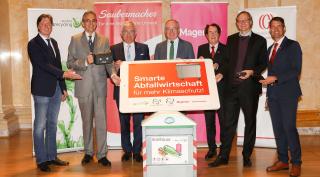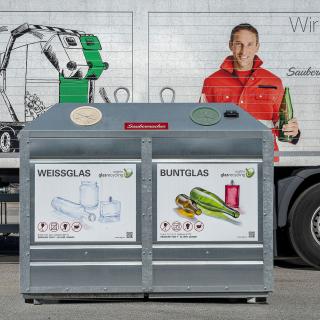
Two Lower Austrian regions are digital recycling pioneers
The pilot projects in Horn and Tulln demonstrate the enormous climate protection potential of the waste disposal sector that is waiting to be tapped with the latest technology. “Data is captured and analysed precisely. Transparency enables waste disposal to be controlled with pinpoint accuracy and therefore to be higher quality and more efficient as well as generating less noise and emitting less CO2,” states Hans Roth, founder of Saubermacher AG. The environmental pioneer’s R&D specialists have collaborated with the Stummer company, Graz University of Technology, the Know-Center, Joanneum Research and Austrian startup SLOC to develop new tools and have been testing them in both regions since last year. “The best waste is waste that is not generated in the first place – and if it is, we need to reuse it as effectively as possible! That’s the prerequisite for sustainable and forward-looking management. Innovative projects like these make a significant contribution and also help with the development of a state-of-the-art, efficient waste management system in Lower Austria,” says Deputy State Governor Stephan Pernkopf.

Project Intelligent Glass Collection. The 600 or so high-tech sensors known as ANDI (ANDI is an acronym representing the German words for automatic, sustainable, digital and innovative) that have been developed by the startup SLOC with practical feedback from Saubermacher measure the contents of 300 waste glass containers and communicate it to an intelligent platform. The IoT tool, also developed by SLOC in collaboration with the Know-Center and early adopter Saubermacher, cross-links a range of parameters, e.g. container levels, the maximum carrying capacity of trucks, etc., and puts together an optimised overall route plan. Containers should not be emptied if they are only half full, for example. “We have increased the average level of glass in containers being emptied by 30 percent,” explains Ralf Mittermayr, CEO of Saubermacher AG. “We have also improved quality. We’ve achieved a reduction of over 80 percent in over-filled containers,” Mittermayr reports. Lockdown demonstrated how sensible dynamic disposal systems are. Whilst regions with static waste disposal systems experienced short-term problems with over-filling due to sudden and significant increases in the quantities being collected, Horn was able to manage the challenge proactively thanks to its dynamic collection system.
“The results were convincing. We’re now migrating from the pilot project to standard operation and want to encourage many other glass collection partners to introduce this kind of system,” says client Haymo Schöner of AGR. Data are transmitted using NarrowBand IoT (NB-IoT) wireless technology supplied by Magenta and the transmission technology has been reliable in meeting the demanding requirements placed on it. “Together with our partners, we are developing digital solutions, in particular with regard to the Internet of Things, that will enable us to optimise the entire value chain. The intelligent glass collection project is a good example of how digitalisation can help increase efficiency and thus simplify processes,” says Andreas Bierwirth of Magenta Telekom.

Project 2 / Raising awareness with artificial intelligence. “Dear Customer! Your residual waste included a considerable number of mis-sorted items. The main problem was lightweight packaging. Please follow the directions on how to sort waste correctly. You will be protecting the environment and the climate! Kind regards, Your Waste Management Association” – this and similar personal messages sent directly to the smartphones of 116 test households in three communities in the Tulln district have managed to improve waste sorting and recycling rates through the use of artificial intelligence. A device known as a recyclables scanner in the collection vehicle uses a range of sensors/cameras and a neural network to identify whether residual waste includes mis-sorted items such as plastic packaging. The recyclables most often ending up in the wrong bin were materials such as waste paper and organic waste. These are important secondary raw materials, but once they have been disposed of in a black bin, they are lost to recycling forever and cannot be used to reduce gases that are harmful to the climate. If the total number of items mis-sorted as residual waste across Austria were reduced, this could save around 350,000 tonnes of CO2 per year. The recyclables scanner was developed through a collaboration between vehicle manufacturer Stummer, Joanneum Research, Graz University of Technology and Saubermacher.

Individualised feedback is essential, since it makes people immediately aware of behaviour that protects the climate and is rewarded by positive feedback. The coronavirus has meant that this pilot project was only able to undertake limited communications. The results show that just knowing that monitoring is occurring can lead to changes in behaviour – as it does with empty speed camera boxes. “Increasing efficiency through state-of-the-art waste systems is the order of the day for communities in the era of sustainability and climate goals. Our pilot projects in Horn and Tulln have successfully demonstrated how efficient digital waste management can be. Our aim has to be to test this system in larger regions, learn how to handle it and roll it out to all regions of Austria as soon as possible,” says Alfred Riedl, President of the Association of Austrian Municipalities. Both projects met the relevant data protection standards.
press release
Contact
For press inquiries please contact:



